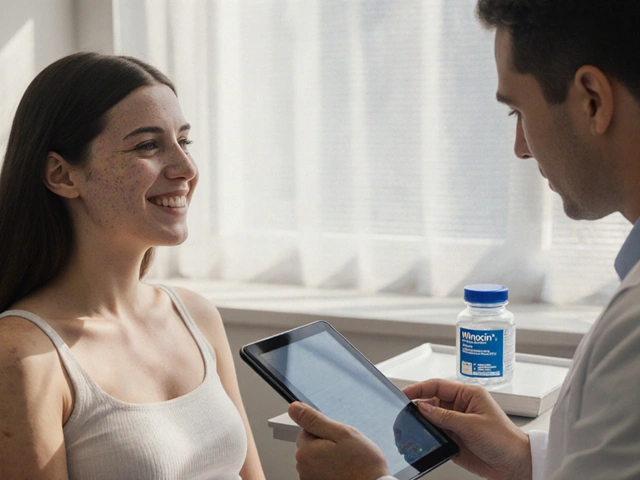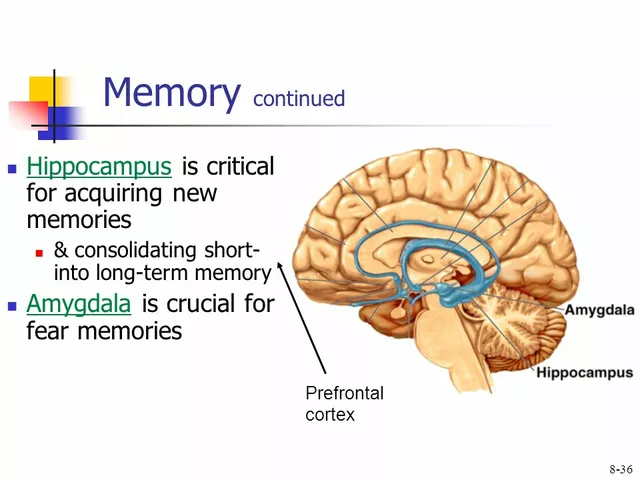You've probably heard of Healthline.com; it's like that go-to friend for health information online. But ever wondered where else you can look for reliable health advice? With so many options out there, finding other trustworthy sources can feel a bit like searching for a needle in a haystack. Lucky for you, we've got a list of some solid alternatives that you might wanna check out.
Different sites offer different perspectives and types of information. Whether you're interested in scientific research or looking for practical health tips, knowing your options can help you make more informed decisions. So, let's jump into our list of top picks that might just become your new favorite health resources.
- NIH (National Institutes of Health)
- WebMD
- Mayo Clinic
- Cleveland Clinic
- MedlinePlus
- Summary and Comparison Table
NIH (National Institutes of Health)
Welcome to the NIH, your backstage pass to the world of medical research. Picture this: a government-funded resource packed with evidence-based info on just about every disease, clinical trial, and health topic you can think of. If you’re hunting for scientifically accurate material, you've hit the goldmine.
One of the coolest things about the NIH is their access to endless clinical trial data. Want to know the latest findings in a particular field? They've got it covered. And since their work is peer-reviewed, you can trust the info is top-notch and unbiased. Plus, with a huge amount of traffic—around 249.53 million visits—they’re a go-to if you're after the most reliable health resource online.
Pros
- Unbiased, peer-reviewed content: Every piece of information has been scrutinized by experts, which is a pretty big deal.
- Access to clinical trial data: If you’re digging deep into the science or looking for specific health studies, this place is a treasure trove.
- Authoritative source for medical research: Recognized globally, it’s like having a personal consultation with top researchers.
- Highest traffic: With over 249.53 million visits, it’s a hotspot for those seeking serious medical info.
Cons
- Complex language for non-experts: The NIH often gets a bit technical. Not so great if you aren’t fluent in medical jargon.
- Less user-friendly interface: Don’t expect flashy graphics or easy navigation; it’s more of a no-nonsense approach here.
- Limited practical health advice: It's heavy on research, light on day-to-day health tips.
Overall, if you're after the kind of hardcore medical facts used by professionals, the NIH is your place. Just brace yourself for some serious scientific lingo along the way.
WebMD
So, if you've ever Googled a weird symptom, you've probably ended up on WebMD. It's been around for a while and serves as a health website that many recognize right away. Think of it as a big online encyclopedia for health-related stuff but with a modern touch.
WebMD offers a wide array of articles, expert-written medical news, and loads of health tools designed to inform and support the curious minds looking for answers. Whether you're punching in your symptoms for a quick diagnosis or reading up on the latest health trends, WebMD's got you covered. It's like having a health guru on call 24/7.
"WebMD is dedicated to providing timely and reliable health information, contributing to a society empowered by accessible health knowledge." – A statement from a WebMD spokesperson
Now, you might be wondering what sets WebMD apart from other health resources and whether it's the right spot for you. Well, here's a quick rundown of the good and not-so-great parts.
Pros
- Easy-to-navigate interface: Designed with the user in mind, even your tech-phobic relatives won't have trouble finding information.
- Wide range of topics: Covers everything from mental health to skin conditions.
- Interactive tools: Symptom checkers and pill identifiers are super handy features.
- Regular updates: New articles and health tips keep popping up, keeping you informed of the latest trends.
Cons
- Advertisement-heavy: Sometimes, the ads feel like they're as frequent as the content.
- Overwhelming information: With so much data in one place, it can feel like drinking from a firehose.
- Not all articles are peer-reviewed: While they have expert contributions, it's always good to cross-check the info with other sources.
For those looking to branch out from Healthline, WebMD is a familiar site that delivers a ton of medical information. Just keep in mind how to navigate around ads and check for the latest updates to get the most out of it.
Mayo Clinic
Imagine having access to health information that's both detailed and easy to digest. That's what the Mayo Clinic offers. Known for their comprehensive guides and expert insights, the Mayo Clinic is like a reliable old pal in the health info world—always ready to dish out advice you can trust.
What sets the Mayo Clinic apart is its heavy focus on medical education and research. They're not just about treating patients; they're about educating the masses. You can find tons of articles on a wide range of topics from heart disease to mental health. And the best part? It's all written in a way that's easy to understand, even if you don’t have a medical degree.
Pros
- Expert-driven content: Written by professionals with years of research and medical experience.
- User-friendly design: Easy to navigate, so finding what you need isn’t a hassle.
- Wide range of topics: From common colds to complex diseases, they've got you covered.
- Focus on preventive care: Learn how to stay healthy before problems start.
Cons
- Limited interactive features: While rich in content, it doesn't offer much in terms of community interaction or forums.
- Occasional overload of information: Sometimes you might find yourself swimming through too many details.
- A bit of a U.S. focus: Geared more toward an American audience, some info might not be as relevant if you're living elsewhere.
So, if you're after medical resources that are comprehensive yet user-friendly, the Mayo Clinic should definitely be on your list. It's that trusty source you can turn to for straightforward health advice while sipping your morning coffee.

Cleveland Clinic
When it comes to reliable health information, the Cleveland Clinic often pops up as a top contender. This nonprofit academic medical center has been around since 1921 and is known for delivering trustworthy content that touches all bases of health and wellness.
What's cool about Cleveland Clinic is that they're not just a website; they're a full-on medical powerhouse with actual hospitals. Peeps working there are real practicing doctors, which makes their insights particularly valuable. So, when you're reading an article about a health condition, you know you're getting info that's backed by real-world experience.
Pros
- Content is authored by medical professionals, ensuring expertise and reliability.
- Offers a broad scope of health topics, from common conditions to niche medical areas.
- User-friendly site with a clean design that's easy to navigate.
- Interactive tools, like symptom checkers, make it a handy resource for quick checks.
Cons
- Can be a bit commercial, with some articles pushing services available at their clinics.
- Not as interactive or community-driven as some other health info sites.
- While expert-driven, some content may lack the down-to-earth tone people might prefer.
If you're into hardcore facts and a professional touch, Cleveland Clinic is a solid choice. They're keen on mixing practical advice with their expert knowledge, so you won't just get the what—expect a bit of the why and how too. However, do keep in mind that some content might slide into promoting their own services, which may not always sit well if you're looking for strictly objective advice.
MedlinePlus
MedlinePlus is like your virtual health encyclopedia, managed by the U.S. National Library of Medicine. It pulls together reliable health information from the National Institutes of Health (NIH) and other reputable sources. If you're looking for well-rounded health information that doesn't dive too deep into medical jargon, this site could be your new best friend.
One cool thing about MedlinePlus is its user-friendly layout. Whether it's understanding a minor ailment or learning about complex medical procedures, MedlinePlus covers a wide array of topics. Plus, they offer content in Spanish, which opens doors for Spanish-speaking folks seeking accurate health insights.
As stated by the National Library of Medicine, "MedlinePlus offers trusted health information for the whole family, providing easy to understand content".
Worried about the authenticity? Rest easy. All content is curated by professionals and is updated regularly to ensure the information stays current. MedlinePlus doesn't just stop at articles; they have interactive quizzes, videos, and even a medical dictionary. It's like having a mini health class right at your fingertips!
Pros
- Wide range of topics covered: From common colds to rare diseases, if it's about health, MedlinePlus probably has it.
- User-friendly and accessible: Easy navigation with an intuitive interface, it’s designed for everyone, not just experts.
- Multilingual content: English and Spanish options available.
- Regular updates: Keeps information fresh and relevant.
Cons
- Limited practical advice: While informative, it might not offer actionable tips like some lifestyle health sites.
- No personalized content: Generalized approach without tailored suggestions.
| Feature | Details |
|---|---|
| Languages | English, Spanish |
| Content Type | Articles, Videos, Interactive Quizzes |
| Updates | Regularly updated |
When searching for accessible, reliable medical information, MedlinePlus stands out as a straightforward and comprehensive resource.
Summary and Comparison Table
Alright, so we've taken a stroll through some top alternatives to Healthline.com. Each of these sites brings something unique to the table, catering to various health needs, from heavy-duty scientific research to more user-friendly medical advice. Let's break it down.
First, NIH is your go-to for serious, evidence-based information. It's like the wise old sage of health websites, packed with peer-reviewed content and scientific accuracy. But keep in mind, it can get a bit complex if you're not a medical pro.
Then we've got WebMD, which strikes a nice balance with easy-to-read articles and the well-loved symptom checker. It's like your everyday buddy who keeps health advice simple and practical.
The Mayo Clinic is another great resource, especially if you want content that's trustworthy and written in a way that's super digestible. Their commitment to thorough, accurate information makes them a standout.
Next up is the Cleveland Clinic. Think of it as the tech-savvy friend, always up-to-date with the latest health news and medical innovations. It's perfect if you want insights from leading medical professionals.
Finally, there's MedlinePlus. This one's a fantastic tool for patient-friendly info that doesn’t dive into too much medical jargon. It's managed by the National Library of Medicine, ensuring you're always in good hands.
Curious how they all stack up? Check out this quick comparison below:
| Website | Strengths | Traffic (Visits) |
|---|---|---|
| NIH | Peer-reviewed, authoritative | 249.53M |
| WebMD | Easy to use, symptom checker | N/A |
| Mayo Clinic | Reliable, user-friendly | N/A |
| Cleveland Clinic | Innovative, professional insights | N/A |
| MedlinePlus | Patient-friendly, trustworthy | N/A |
In the end, the best health website for you depends on your personal needs and preferences. Whether you're after detailed scientific data or just a simple health tip, these alternatives have got you covered. Consider your priorities and dive into the wealth of resources each site has to offer.






NIH is great if you want to read 50-page PDFs written in Latin and then cry into your oat milk latte. I just want to know if my headache means I have a brain tumor or if I just stayed up too late watching cat videos.
WebMD is basically the digital equivalent of that one uncle who Googles every symptom and then calls you at 3am screaming about Ebola. I love it. Also, why does every article have 17 ads for ‘miracle’ weight loss pills? Is this a health site or a crypto scam portal?
Let’s be real - the Mayo Clinic is the only site that doesn’t treat you like a clueless child OR a walking liability. They don’t sensationalize, they don’t monetize your fear, and they don’t pretend that ‘eating more kale’ is a cure for diabetes. The rest of these sites? They’re just algorithm-driven fear farms. And yes, I’ve read the peer-reviewed studies. You haven’t.
MedlinePlus? Cute. But did you know they’re funded by the same people who told us hydroxychloroquine was a miracle drug? And why is everything so bland? It’s like the government hired a librarian to write health advice after they banned adjectives. Also, no emojis. No soul. No hope.
I use Mayo Clinic for myself and MedlinePlus for my mom. Simple, clear, no panic. Works every time.
None of these are trustworthy. They’re all controlled by Big Pharma. The NIH? A front. WebMD? A marketing arm. Even the Mayo Clinic has ties to the CDC’s shadow network. You think they want you healthy? No. They want you dependent. Check the funding. Always check the funding.
Mayo Clinic is the real MVP 🙌 I’ve used it when my knee hurt, when I was stressed, even when I thought I had a rare disease (I didn’t). It’s like your smart friend who doesn’t judge you for Googling ‘why does my toe itch’ at 2am. You’re welcome.
WebMD’s symptom checker once told me I had ‘possible alien abduction syndrome.’ I’m not mad. I’m impressed.
One must question the epistemological foundations of these platforms. Are they not merely corporatized extensions of the medical-industrial complex? The NIH, while ostensibly authoritative, is still beholden to federal appropriations - and thus, politically compromised. MedlinePlus? A sanitized, bureaucratic facade. One cannot derive truth from institutions that are, by design, constrained by bureaucracy and funding cycles.
Look, if you’re using any of these sites to self-diagnose instead of seeing a doctor, you’re not just irresponsible - you’re a liability. I’ve seen people panic because they read ‘possible sign of cancer’ on WebMD. Newsflash: your headache is not a brain tumor. Go outside. Drink water. Stop scrolling.
These sites are all part of the globalist agenda to control your health narrative. The NIH? Controlled by the UN. WebMD? Owned by a conglomerate that also owns the CDC. Mayo Clinic? They’ve got ties to the WHO. You think this is about health? No. It’s about compliance. Wake up. The truth is buried under layers of ‘expert’ jargon and sanitized language. Look at the funding. Look at the sponsors. Look at the silence around natural cures.
Love the Mayo Clinic! I showed my grandma how to use it and she hasn’t called me in panic mode since 😊
I’ve been using MedlinePlus for years. It’s not flashy, but it’s honest. No ads, no hype, just facts. If you want to actually understand something, not just feel scared, this is the place.
WebMD is dangerously misleading. The symptom checker is a psychological trap. It preys on anxiety. And the articles? Often written by freelance writers with zero medical training. You’re better off reading a textbook.
NIH and MedlinePlus are the only ones I trust. Everything else is noise. I’m a nurse - I’ve seen what happens when people believe WebMD over their doctor. Don’t be that person. Use the sources that actually cite studies. And yes, the NIH site is clunky - but it’s right. That’s what matters.